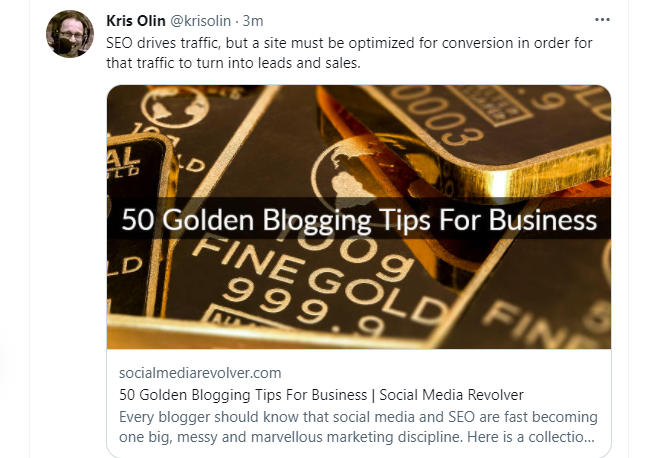
Every blogger should know that social media and SEO are fast becoming one big, messy and marvellous marketing discipline. Here is a collection of 50 blogging tips from my most recent and valuable posts on topics that are essential for a successful blog marketing effort. If you’re just starting out with a blog, these tips may save you a lot of time – and perhaps a little heartache as well.
Blogging Tips For Strategy
Blogging is a powerful tool to be used in marketing as well as presenting yourself as an expert, but you need to take notice of a few simple rules to make it more effective for you or your business.
- Headlines are just as important as the blog post, and in some ways, more. It takes a pretty good one to capture the attention of readers who are scanning scores if not hundreds of Web pages every day.
- SEO drives traffic, but a site must be optimized for conversion in order for that traffic to turn into leads and sales. < Tweet this!
- Companies err by concentrating on SEO and ignoring CRO, conversion optimization. The fatal flaw of an SEO fixation is that it takes your eye off the ball. SEO is about traffic. Traffic is important, but it’s not the goal.
- The fundamental purpose of Internet marketing, and business blogging in this case, is conversion.
- Publish regularly. Have a calendar based plan for your blog posts. Once a week is good, twice a week even better. The important thing here is that you stick to your plan.
- Consider hiring an SEO specialist. This is one of the most important decisions you will make in your pursuit of online marketing success. (see points below)
Blog Design And Functionality
No matter how brilliant a website’s design, no matter how elegant its navigation, sooner or later visitors will decide whether to take action because of something they read. In the end, the effectiveness with which a website converts visitors hinges on words. If a new website is going to hit all the right notes, its content must be just as well crafted as its design and programming.
- Primary SEO keywords should appear at the beginning of headlines. This helps readers as well as search engine crawlers.
- Use bold text for keywords; again, this help readers in addition to strengthening SEO.
- Use bulleted lists to the attention of readers and crawlers.
- Insert primary keywords at the beginning of Meta titles.
- Build a strong internal link structure on your site.
- Optimize site images – this is an often-overlooked technique that boosts SEO and user experience.
- The biggest error in corporate website content: inward focus. <Tweet this!
- The second biggest error: burying the lead under a pile of unimportant words. Give readers the point first of all, and then elaborate.
- The third biggest error: poorly optimized or non-existent Meta content. Your site will seriously confuse Google and readers without proper optimization.
- The fourth biggest error: Too much content. If you can say it in 1000 words, you can say it more effectively in 500.
- The fifth biggest error: Lame or non-existent calls to action. If you don’t tell readers what to do next, they won’t do anything.
- Corporate sites tend to have weak calls to action because they don’t take the time and apply the creativity to develop them in the first place.
SEO For Bloggers
Title Tags are the Nuclear Warheads of Content Marketing.
While Title Tags contain only a very small mass – roughly 65 characters – they pack an unbelievable punch. Because of title tags’ enormous impact on SEO, social sharing and conversion, content marketers should know how they work, and how to put them to work.
- Title tags are the most important piece of Meta information on a Web page in terms of SEO.
- Title tags are also crucial for optimizing user experience and facilitating social shares.
- Title tags may or may not include a branding message.
- Title tags must always include the primary keyword phrases for the Web page it represents. < Tweet this!
- Title tags can be composed for conversion: snappy titles inspire social sharing. The decision whether to stress SEO or conversion depends in large part on the nature of the content.
- Skilful use of H1 title tags boosts conversion without compromising the SEO integrity of title tags.
- Title tags should be updated if on-page content changes relevant keywords.
- The biggest factor in selecting an SEO partner: understanding their methodology. If the agency doesn’t have a formal one, or if the methodology is outdated, results inevitably will be poor.
- The second biggest factor: understanding the SEO’s track record. Actions speak louder than words!
- The third biggest factor: making sure there is a good fit. Every SEO has a sweet spot; if you’re not in it, results will lag.
- The fourth biggest factor: the longevity and stability of the SEO. You don’t want to start from scratch after investing years developing a program with a partner who suddenly disappears.
- The fifth biggest factor: great relationships. You don’t want to start over after investing years on a program with a partner who suddenly disappears.
Some web content writers, as well as web designers view on-page SEO as a necessary evil to an effective content strategy on the web. However, when properly executed, SEO can actually enhance a site visitor’s experience, rather than detract from it.
Writing For Web
Web writers are a special kind of breed. Their jobs include writing AdWord ads, corporate bios, blog post titles, calls to action, display ads, Facebook fan page posts, landing pages, Meta descriptions, taglines, testimonials and tweets.
- Writing AdWords ads requires more precision than perhaps any other form of Web writing.
- Corporate bios require genuine creativity to be readable and relevant.
- The art of writing brochures should not be lost, because it’s still a highly valuable business skill.
- Landing page composition is too important to be a sideline job: great landing page writers are made, not born.
- Several important (and not always understood techniques) go into writing a truly persuasive sales proposal.
- Taglines are the most all-around demanding form of business writing there is. There’s a reason why brilliant taglines cost a fortune.
- Twitter may seem like a frivolous medium, but great writing skill is required for effective business tweets. <Tweet this!
- “Different from” is universally accepted, but “different than” is not.
- Avoid the expression “if and when.” Not even experts understand its meaning.
Social Sharing And Blogging
Twitter is a feast-or-famine marketing tool. It can help you achieve important business goals, or it can be a monumental waste of time.
Social Sharing is the latest ‘add on’ in blogging and Twitter has become one of the most important social sharing platforms. Here are some practical tips how to make Twitter perform better for you.
- On Twitter, define your purpose clearly before launching your page.
- Make sure you have adequate resources to support your Twitter program. Many firms grossly underestimate the time and effort needed.
- Select the right Twitter interface platform to support your program. They all have strengths and weaknesses.
- Vet your Twitter followers and clean them up to avoid being buried under a mountain of spammers.
- Learn the basic types of tweets and best practices for writing them before you start tweeting.
- Don’t tweet on one or two themes all day long: variety helps attract followers.
- Although you have 140 characters to work with, tweets at 100 characters or less can be very effective and draw retweets.
- Avoid jargon and exotic abbreviations in tweets – the longer it takes someone to get your drift, the less likely they’ll be to pay attention to you.
- Schedule certain types of tweets in advance to save time and make sure you’re getting the full message out.
- Always respond to people who retweet your material and ask you questions.
- Always be ready to lend a hand to fellow tweeps – giving to get works well on Twitter.
I hope these 50 tips will help you in your blogging endeavours. If you have any blogging tips of your own please share with us.
[Image credits – Main image by hamiltonleen/Pixabay; other images, videos, infographics or screen prints are from their respective websites and/or social platforms]

Brad Shorr is Director of Content & Social Media for Straight North. With agency, freelance and in-house experience, he brings a broad perspective to Internet marketing issues. His posts about social media, SEO copywriting and marketing strategy appear on many industry leading blogs.

Comments are closed.